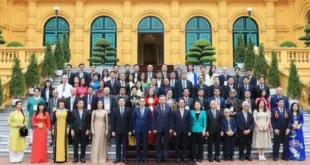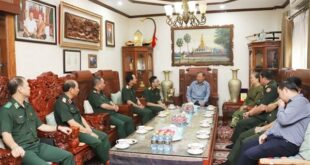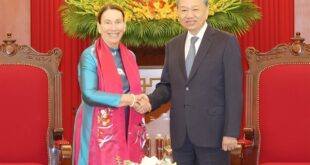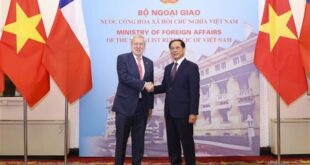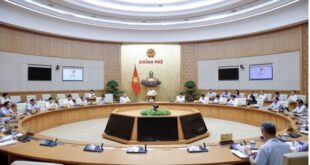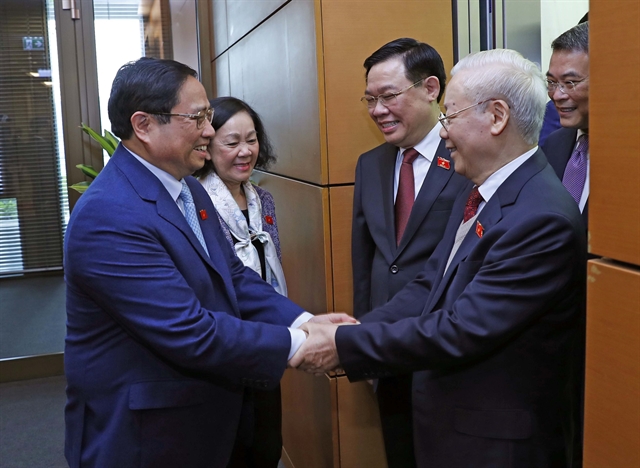 |
| Party General Secretary Nguyễn Phú Trọng attends the 15th National Assembly’s fifth extraordinary meeting in Hà Nội on Monday. VNA/VNS Photo Nhan Sáng |
HÀ NỘI – The 15th National Assembly (NA) started its fifth extraordinary meeting in Hà Nội on Monday, where NA deputies will discuss and adopt the draft revised laws on land and credit institutions.
This extraordinary meeting opened in the presence of Party General Secretary Nguyễn Phú Trọng, State President Võ Văn Thưởng, Prime Minister Phạm Minh Chính, NA Chairman Vương Đình Huệ, and many Party, State and NA officials and former leaders.
The revised land law has 16 chapters and 260 articles, with the removal of five articles and amendments to 250 articles in the law presented at the 15th NA’s sixth session.
Meanwhile, the revised law on credit institutions has 15 chapters and 210 articles, with the removal of four articles, supplement of 11 articles and amendments made to several others from the law presented at the previous session.
The deputies will consider a draft resolution on several mechanisms and special policies to remove bottlenecks to accelerate the implementation of national target programmes. Besides, they will scrutinise the capital supplement of the mid-term public investment plan with central budget capital for the 2021-2025 period from the general reserve source, and the capital supplement of the mid-term public investment plan for Vietnam Electricity from the reserve source of the mid-term public investment plan.
The extraordinary meeting will conclude on Thursday (January 18), with a break on Wednesday (January 17) for competent agencies to revise and complete the draft laws and resolution.
Addressing the meeting, NA Chairman Vương Đình Huệ emphasised that the fifth extraordinary session of the 15th NA had special significance in implementing the resolutions of the 13th National Party Congress and the five-year socio-economic development plan for the period of 2021-2025, aiming towards the 14th National Party Congress.
The decisions made at this session were crucial for the socio-economic development for the entire tenure, he said, urging NA deputies to uphold a high sense of responsibility in providing opinions on draft amended laws to submit to the NA for consideration and approval.
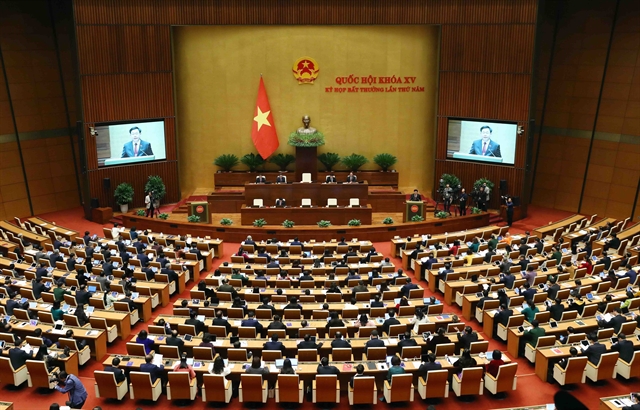 |
| The National Assembly Chairman Vương Đình Huệ delivers an opening speech at the 15th National Assembly’s fifth extraordinary meeting in Hà Nội on Monday. VNA/VNS Photo |
Presenting the explanation, reception and revision of the draft of the amended Land Law, Chairman of the NA’s Economic Committee Vũ Hồng Thanh stated that to improve administrative procedures regarding land when organisations or businesses transferred real estate, the State would not reclaim the land but would allocate and charge land use fees or lease the land without auctioning land use rights or competitive bidding for investor selection.
The recipient of the transfer would be issued a certificate of land use rights and ownership of land property according to Government regulations after both the transferor and the transferee fulfilled their financial obligations as stipulated by law.
The draft amended law stipulated that, except for cases where the recipient considered themselves as heirs, individuals who did not directly engage in agricultural production must establish an economic organisation and present a plan for the use of agricultural land when receiving transfers or gifts of agricultural land exceeding the regulated area.
In addition, the draft amended law specified that land could only be reclaimed for commercial housing projects, or residential and commercial combination projects under the category of “urban construction investment projects”.
It also prioritised negotiated land use rights for projects not utilising State budget funds in cases of land reclamation and those currently holding land use rights. According to the draft amended law, individuals with land use rights and approved land use purpose conversion could propose investment projects and continue to use the land even when they were in the specified land reclamation list.
The NA Standing Committee urged the Government to promptly propose regulations on higher taxes for individuals using large land areas, owning multiple houses and engaging in land speculation. Additionally, efforts should be made to enhance the quality of appraisals to prevent the accumulation of land by organisations and individuals, hindering the ability of other investors to access land.
The draft amended law also outlined various land valuation methods, including comparison, surplus value, income and adjustment factors for land prices.
Land valuation methods
During the discussion, Deputy Nguyễn Hoàng Bảo Trân from the southern province of Bình Dương proposed that the surplus method for land valuation, based on assumptions and estimates, might have low reliability.
Additionally, she argued that assuming a constant increase in land value was unreasonable, as economic conditions might lead to a decline, especially in a stagnated real estate market. This method might not accurately measure risk factors and economic disadvantages.
“Calculating assumptions is very complex, resulting in uncertain, inaccurate valuation with significant errors. Changing a single parameter in the assumed factors can alter the valuation result. This has been the cause of difficulties and delays in determining and deciding specific land prices in recent times,” she noted.
Sharing a similar viewpoint, Deputy Hà Sỹ Đồng from the central province of Quảng Trị suggested not applying the surplus method, instead favouring the direct comparison method for more accurate land valuation.
Regarding the issuance of land price lists, Đồng said that it was impractical to establish land price lists annually and suggested a five-year interval instead. If there were market price fluctuations, an adjustment coefficient method should be applied to ensure compatibility.
Concerning land use rights, Deputy Lê Thanh Hoàn from the central province of Thanh Hóa remarked that the limitations of landowners’ land use rights have not been sufficiently clarified.
Using examples from various countries worldwide, he suggested that this legal amendment was an opportunity to specify land users’ rights, particularly in the case of underground construction. He proposed adding provisions stating that land users had the right to use the airspace above the land surface and the subsurface land, reasonably and legally according to government regulations.
Regarding the principles of compensation and resettlement when the State reclaimed land, Deputy Nguyễn Đại Thắng from the northern province of Hưng Yên proposed that regulations must ensure that citizens had adequate housing, income, and living conditions equal to or better than their previous residences.
In agreement with the provision that the location for resettlement areas should prioritise choices within the commune, ward or town where the land was being reclaimed, Deputy Hoàng Văn Cường from Hà Nội recommended giving priority to selecting land areas designated for residential purposes, with the most advantageous location within the chosen area for the formation of the resettlement area. – VNS
- Reduce Hair Loss with PURA D’OR Gold Label Shampoo
- Castor Oil Has Made a “Huge” Difference With Hair and Brow Growth
- Excessive hair loss in men: Signs of illness that cannot be subjective
- Dịch Vụ SEO Website ở Los Angeles, CA: đưa trang web doanh nghiệp bạn lên top Google
- Nails Salon Sierra Madre
 VnExpress News The News Gateway of Vietnam
VnExpress News The News Gateway of Vietnam
